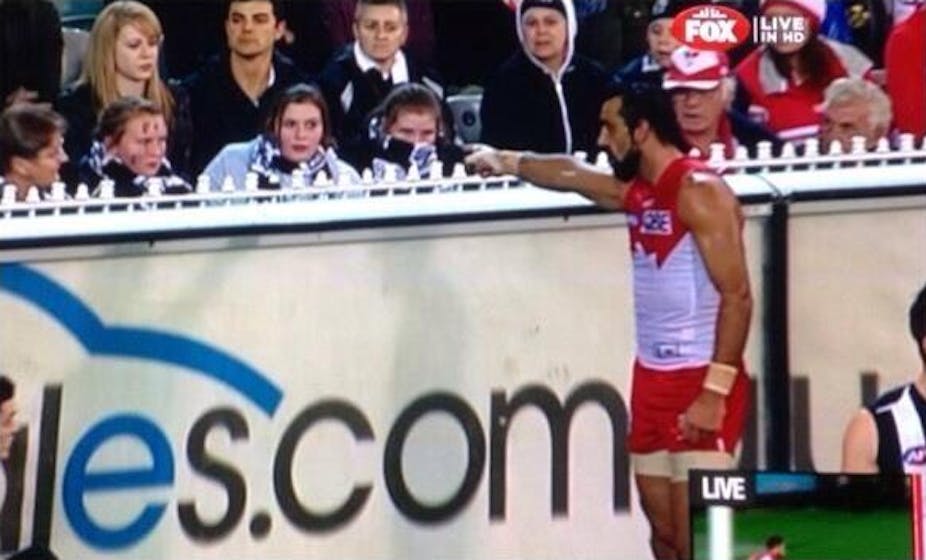Friday night’s AFL match between Collingwood and Sydney marked the opening of the code’s Indigenous Round. Yet the chance for the contribution of Indigenous footballers to the game - both past and present - to be recognised and celebrated was marred by a racial taunt from a young supporter at Sydney’s Indigenous star Adam Goodes.
The round of games aimed to recognise the contribution of Indigenous people and culture to the broader Australian society. While showcasing the unique talent and pride in culture of the Indigenous community, it simultaneously noted the struggle against racism that has accompanied the achievements of many Indigenous people in this country.
While the AFL should be proud of the work it has done to stamp out racism in the sport, the incident where Goodes was called an “ape” by a crowd member has come to be the defining moment of the round. It serves as a reminder that there is still a long way to go to remove racism from Australian society.
What is most shocking about the incident is that it is not a boozed-up, angry supporter being identified by TV cameras as the perpetrator of the abuse. We have become accustomed to seeing this in racist incidents in the public and sporting arena, most recently involving North Melbourne’s Sudanese-born player Majak Daw.
This racist slur, however - one which left Goodes visibly hurt and struggling to continue with the game - was made by a 13 year-old girl. As Goodes later commented:
I turned around and when I saw it was a young girl and I thought she was 14, that was my initial thought, I was just like “really?”. I just thought how could that happen?
I wrote in a piece for The Conversation recently that for racism to be challenged, bystanders need to take responsibility and stand up to perpetrators. Be it through direct action or by using social media to publicise incidents, awareness should be raised and abusers “named and shamed”.
However, when the abuser is a 13 year-old girl who doesn’t understand what it means to call an Indigenous person, or a black person from any cultural background, an “ape”, what is the value of this? And what then is an appropriate action for someone who is not filled with hatred but is ignorant of the harm she had caused?
This issue was raised in the response of AFL and club officials. While quick to condemn the racism and provide support to Adam Goodes, they were also concerned about the girl’s welfare. Collingwood president Eddie McGuire was quick to apologise to Goodes on behalf of the club, whilst also showing support for the young Collingwood supporter who he said would receive “counselling services”. He later stated: “we won’t be abandoning her”.
AFL boss Andrew Demetriou also called for the girl to be supported, claiming that though there was zero tolerance for racism in the AFL:
..what we do have to understand is this is a 13-year-old girl. We have to be very, very sensitive and very, very careful about how this girl gets treated from this point onwards.
This incident highlights the complexity with which racism enters a society and is normalised until the meaning of insidious, racist terms become dispersed, invisible to some who would voice them. The taunts, however, are no less deeply felt by those groups who cannot forget the original meanings of the term, and the personal and community-wide legacy they have left.
In a testament to the quality of Goodes as an ambassador for the sport and his community, he later called for the girl to receive support despite initially pointing out the girl to security guards. This demonstrates the generosity and graciousness of a man who has achieved much, despite having to overcome the hurt and pain of his early years where he was verbally taunted on the basis of his race and appearance.
In his press conference the next day, Goodes explained that it was now about education for the girl and for society. While this meant for him that he had to make a stand for himself, his family and his community, to tell people “that a simple name, a simple word, can cut so deep”, he did not blame the girl and asked for the public to give her support, just like he had received:
I just hope that people give the 13 year-old the same sort of support because she needs it, her family need it, the people around them need it. It’s not a witch hunt. I don’t want people to go after this young girl.
This is significant, given that social media provides a platform not just for condemning racism, but also for bullying people who have made a public error of judgement.
Perhaps there is something positive to be made out of this untimely reminder of the persistence of racism in Australian society. Rather than these words coming from a deeply entrenched, racist world view, it came from an innocent heart which can learn from the experience.
This is summed up perfectly by Adam Goodes, who called for education instead of naming and shaming “so it doesn’t happen again”. What a champion.

